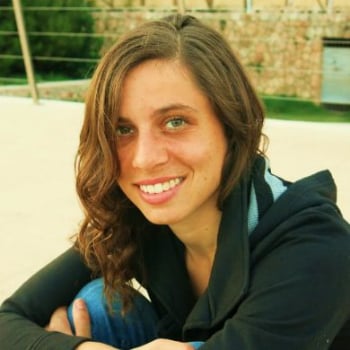
What position do you hold at AMIGOS and why do you like working there?
Marta: I am one of the Regional Directors at AMIGOS. I am part of the Programs team, and I am responsible for developing and maintaining partnerships with organizations in Colombia, Peru, and Ecuador in order to co-develop programs that are valuable for youth participants from the United States as well as youth in the regions where we work. We oversee the recruitment, selection, and training of our project staff teams, as well as overall program evaluations.
Two of the many things I love about my job is being able to build both institutional and personal relationships across the Americas, and mentoring staff teams in realizing their full potential as leaders for themselves, their projects, and their communities.
Did you volunteer abroad? If so, where and what inspired you to go?
Marta: I volunteered with AMIGOS in Costa Rica when I was 16 years old. I participated because my neighbor came back and told me about his experience. To be honest I had no idea what I was getting myself into! I spent the first two nights crying and missing home. In the following 6 weeks I spent in Costa Rica, my maturity level sky-rocketed about 4 years. The impact this experience had on my life is clear – not only do I work at AMIGOS full-time but I intend to pursue a career in international nonprofit leadership.
What does the future hold for AMIGOS- any exciting new programs to share?
Marta:So many exciting things to share! Where to begin?
In 2015, our Ecuador summer program focuses on training participants on the basics in entrepreneurship. Participants apply for seed funding, develop a proposal, and then launch a microenterprise! These programs have a profound impact on how participants view themselves and their ability to impact their world. The AMIGOS program fits into our Plan Internationals 5-year social and financial education program that forms local youth clubs that are also trained first on soft skills like self-confidence and values, and later on hard skills like financial and business planning.
Additionally, we now have Gap semester and year-long programs in Nicaragua and we were just selected by Tufts University through a highly competitive process to coordinate two international program sites in Oaxaca, Mexico and Leon, Nicaragua for the Tufts 1+4 Bridge-Year Program starting in Fall 2015. Five to seven Tufts students will be selected and placed in each program site for an academic year. It’s a novel bridge year program that will offer incoming students of all economic backgrounds the opportunity to engage in a year of full-time national or international service before beginning the traditional college experience.
How does your organization differ from other ones in the industry?
Marta:Our partnerships and 1-1 youth model. Beyond being a key aspect of impactful programs – partnerships ARE the program. Our partnerships open doors to experiences that would not be accessible to a foreign nonprofit, and AMIGOS provides unparalleled opportunities for meaningful collaboration and exchange in rural communities that have limited access to education and travel.
Each AMIGOS project includes local youth in trainings and leadership opportunities. In order to be a leader, participants must identify within themselves what is inspiring, and learn how to inspire action in others. In all countries where we work we form partnerships at a high level with US embassies and National partner agency offices, as well as at a community level with host families and youth clubs in the rural communities where we work.
What is one thing you would tell any future volunteer?
Marta: When you sign up for AMIGOS, there is no way to tell what you are getting yourself into. This is an experience that is incredibly challenging, and much more inspiring than you can imagine. There is no way for you to be prepared enough – just take the risk, and be open for the adventure!
How do you think volunteer abroad will change over the next ten years?
Marta:I think that International Volunteer opportunities will become integrated as a standard part of anyone’s education – and be incorporated into high school and college curriculums, making them more accessible and inclusive of economically diverse populations. They will also adapt to a more connected, faster paced world in which potential volunteers are more educated, informed, and well-travelled than they have been until now. The international aspects will change in the sense that public-private partnerships will become more important, public offices will recognize the importance of international volunteer programs and seek out funding for these opportunities.